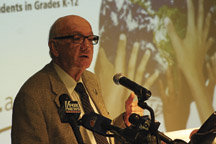Teachers will have a way to approach the thorny subject of 9/11, global security, terrorism, and other subjects thanks to a new curriculum unveiled at the Liberty Science Center on July 14.
Liberty Science Center served as a conduit for developing the curriculum as educators from around the state worked together to work out the complicated details of an extremely challenging subject.
For the past three years, members of the 4 Action Initiative – a joint project of Families of September 11, The New Jersey Commission on Holocaust Education, and Liberty Science Center – has worked to develop a curriculum for teaching one of the most challenging lessons conceivable: how to talk to schoolchildren about terrorism.
“Every time I go to the cemetery to visit my husband’s grave – especially when I go with my children – I can assure you, peace is a better alternative than what we have now.” — Maryellen Salamone
____________
Dave Hespe, Liberty Science Center co-executive director and vice president of STEM Education (Science, Technology, Engineering, and Math) said the curriculum will make a difference in people’s lives, especially for those students who weren’t even born when the attacks happened, calling it a necessary addition to the curriculum.
“How can we assure that our children understand the events of 9/11 in that greater context, and other events going around the world, and how do we connect our children’s lives with those events?” he asked.
The goal is to provide teachers with learning opportunities along many different content areas, not just for children today, but also for children in the future. But he said students learn when it has relevance to their lives, and this is something difficult to do when it involves events that have great suffering and great horrors.
“But these are also events that fundamentally changed the world in which these students live,” he said. “These events cannot be down played or brushed over. They must be openly discussed, and discussed well in classrooms across grade levels and generations.”
He said the lesson plans incorporated in this group will give the teachers what they need to provide those kinds of learning opportunities for students.
Dr. Bill Tansey, chairman of the Board of Liberty Science Center, read from a 2008 call to action by former New Jersey Gov. Tom Kean Sr., who chaired one of the most important national investigations into the attacks.
“Sept. 11,” Kean said, “was an event that changed our world, and we need to use care and sensitivity to teach our children now and in the future, and we must use this knowledge to transform the county.”
Acting N.J. State Education Commissioner Christopher Cerf called this an extraordinary moment in education.
The idea for the curriculum came from Maryellen Salamone, co-founder of Families of September 11, who said she saw her own children’s teachers struggling with the subject and she decided to provide them with the tools they needed.
“I actually believe in the potential for peace on earth,” she said. “Before 9/11, I believed in it and even more so after. Every time I go to the cemetery to visit my husband’s grave – especially when I go with my children – I can assure you, peace is a better alternative than what we have now. Our generation did not do such a great job in finding and attaining peace on earth. This is not a peaceful world. So we have a choice. We either throw in the towel or we look to future generations.”
She said she refuses to give up.
“I think it is our job as parents and as teachers and as adults to teach our next generation,” she said.
Three years ago, 4 Action Initiative began a series of meetings with teachers and others to create a platform that would allow teachers to broach subjects such as terrorism, recovery, public memory, and aspects of human behavior that acting N.J. Commissioner of Education Chris Cerf – a one-time history teacher – described as “highly charged.”
In 2008 to 2009, more than 60 teachers around the state agreed to pilot test lessons in their classrooms, and from these, the final lesson plans emerged.
While the curriculum will not be mandated by the state, it will be available to teachers in all school districts as a tool for dealing with one of the most significant events in modern history and it will be available, free of charge, on the New Jersey Department of Education website in time for the 10th anniversary of the tragic events.
